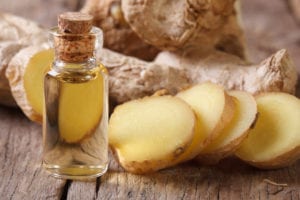Written by Greg Arnold, DC, CSCS. Ginger essential oil aromatherapy significantly decreased postoperative nausea and vomiting in the participating subjects compared to the control group that inhaled saline.
 Up to 40% of those who undergo a surgical procedure can experience postoperative nausea and vomiting1 . Several risk factors associated with an increased risk of postoperative nausea and vomiting include female sex, non-smoker, history of motion sickness, duration of anesthesia and the use of postoperative opioids 2,3. Because postoperative nausea and vomiting can increase patient distress 4 and length of hospital stay 5, finding ways to decrease its’ occurrence is of increasing interest.
Up to 40% of those who undergo a surgical procedure can experience postoperative nausea and vomiting1 . Several risk factors associated with an increased risk of postoperative nausea and vomiting include female sex, non-smoker, history of motion sickness, duration of anesthesia and the use of postoperative opioids 2,3. Because postoperative nausea and vomiting can increase patient distress 4 and length of hospital stay 5, finding ways to decrease its’ occurrence is of increasing interest.
This 2017 South Korean study was a quasi-experimental design with a non-equivalent control group 6. Sixty subjects (30 males, 30 females) between the ages of 37 and 64 who had just undergone at least 60 minutes of general anesthesia for “major abdominal surgery” (e.g., liver, gallbladder, pancreas, appendix), received either a necklace containing 0.3mL of ginger essential oil (30 subjects) or a necklace containing saline (30 subjects) immediately upon starting postoperative care. All patients were instructed to wear the necklace for 24 hours and to inhale the aroma while naturally deep breathing. Nausea and vomiting were assessed at baseline, and again at 6 , 12, and 24 hours post surgery using a Korean version of the Index of Nausea, Vomiting, and Retching 6 that included 8 questions totaling a score from 0 (no nausea/vomiting) to 32 (worst possible nausea/vomiting).
The researchers noted significant benefits in the ginger group at 12 and 24 hours after the surgery:
| 0 hour post-op | 6 hour post-op | p-value | 12 hour post-op | p-value | 24 hour post-op | p-value | |
|---|---|---|---|---|---|---|---|
| Ginger | 11.8 | 1.6 (86.5% decrease) | < 0.001 | 100 | < 0.001 | 0.83 (99.3% decrease) | < 0.001 |
| Placebo | 11.57 | 10.47 (9.6% decrease) | < 0.001 | 9.07 (21.7% decrease) | < 0.001 | 7.2 (37.8% decrease) | < 0.001 |
Results (using ANOVA) showed that there were significant main effects of group (F = 71.21, p < 0.001) and time (F = 73.87, p < 0.001) on the mean scores of PONV. Mean PONV scores in the experimental group were significantly lower than those in the placebo control at all three time points (6, 12, and 24 hours) after aromatherapy. These results align with previous studies that show a positive effect of ginger essential oil aromatherapy on postoperative nausea and vomiting 7.
This study has several limitations. The study results cannot be generalized because the sample was limited to a hospital in Korea. Also the study design is not ideal in that the number of patients was small and there was no blinding or randomization. Furthermore, the fact that data collection was done by research assistants, although they were trained in data collection, could potentially have contributed to observation bias. Lastly, levels of nausea and vomiting that could have happened immediately following surgery (while patients were recovering from anesthesia) were not determined.
The researchers conclude that “ginger essential oil inhalation has implications for alleviating postoperative nausea and vomiting in abdominal surgery patients”; however, “further research is needed to develop more effective options for aromatherapy with ginger essential oil, including a shorter interval of measurements on postoperative nausea/vomiting and different doses, duration, and types (blended or single oil) of ginger essential oil.”
Source: Lee, Yu Ri, and Hye Sook Shin. “Effectiveness of Ginger Essential Oil on Postoperative Nausea and Vomiting in Abdominal Surgery Patients.” The Journal of Alternative and Complementary Medicine 23, no. 3 (2017): 196-200.
© Mary Ann Liebert, Inc.
Posted November 21, 2017.
References:
- Team ASoPNPPSW. ASPAN’S evidence-based clinical practice guideline for the prevention and/or management of PONV/PDNV. Journal of perianesthesia nursing: official journal of the American Society of PeriAnesthesia Nurses/American Society of PeriAnesthesia Nurses. 2006;21(4):230.
- Gan TJ. Risk factors for postoperative nausea and vomiting. Anesthesia & Analgesia. 2006;102(6):1884-1898.
- Apfel C, Heidrich F, Jukar-Rao S, et al. Evidence-based analysis of risk factors for postoperative nausea and vomiting. British journal of anaesthesia. 2012;109(5):742-753.
- Eberhart L, Mauch M, Morin A, Wulf H, Geldner G. Impact of a multimodal anti‐emetic prophylaxis on patient satisfaction in high‐risk patients for postoperative nausea and vomiting. Anaesthesia. 2002;57(10):1022-1027.
- Edler AA, Mariano ER, Golianu B, Kuan C, Pentcheva K. An analysis of factors influencing postanesthesia recovery after pediatric ambulatory tonsillectomy and adenoidectomy. Anesthesia & Analgesia. 2007;104(4):784-789.
- Lee YR, Shin HS. Effectiveness of Ginger Essential Oil on Postoperative Nausea and Vomiting in Abdominal Surgery Patients. The Journal of Alternative and Complementary Medicine. 2017;23(3):196-200.
- Hosseini FS, Adib-Hajbaghery M. Ginger essence effect on nausea and vomiting after open and laparoscopic nephrectomies. Nursing and midwifery studies. 2015;4(2).
